智能汽车 英文
智能汽车英语作文150字
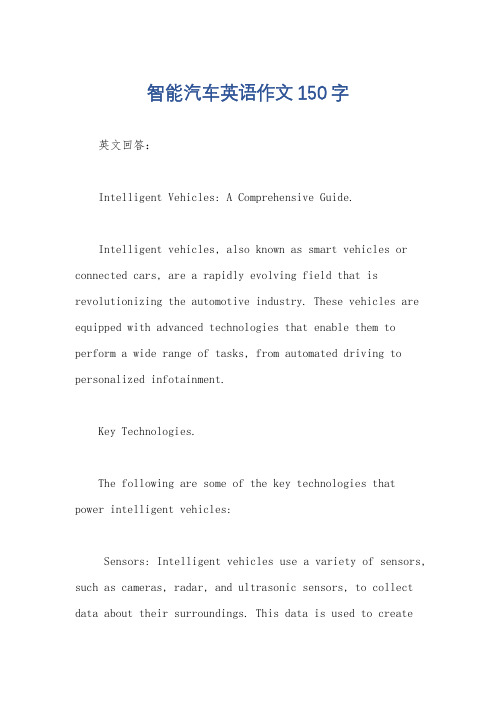
智能汽车英语作文150字英文回答:Intelligent Vehicles: A Comprehensive Guide.Intelligent vehicles, also known as smart vehicles or connected cars, are a rapidly evolving field that is revolutionizing the automotive industry. These vehicles are equipped with advanced technologies that enable them to perform a wide range of tasks, from automated driving to personalized infotainment.Key Technologies.The following are some of the key technologies that power intelligent vehicles:Sensors: Intelligent vehicles use a variety of sensors, such as cameras, radar, and ultrasonic sensors, to collect data about their surroundings. This data is used to createa detailed map of the vehicle's environment, which is then used for navigation, collision avoidance, and other tasks.Actuators: Actuators are devices that convertelectrical signals into physical actions. In intelligent vehicles, actuators are used to control the vehicle's steering, braking, and acceleration.Computers: Intelligent vehicles rely on powerful computers to process the data collected by sensors and to control the vehicle's actuators. These computers are typically embedded in the vehicle's electronic control unit (ECU).Software: The software that runs on intelligent vehicles is responsible for controlling the vehicle's various systems and functions. This software is typically developed by automotive manufacturers and third-party software providers.Connectivity: Intelligent vehicles are typically connected to the internet, which allows them to accessreal-time traffic data, weather updates, and other information. This connectivity also enables the vehicle to communicate with other vehicles and infrastructure, such as traffic signals and smart cities.Benefits of Intelligent Vehicles.Intelligent vehicles offer a number of benefits over traditional vehicles, including:Safety: Intelligent vehicles can help to reduce accidents by providing drivers with warnings aboutpotential hazards and by automatically intervening to prevent collisions.Convenience: Intelligent vehicles can make driving more convenient by automating tasks such as lane keeping, adaptive cruise control, and parking.Efficiency: Intelligent vehicles can help to improve fuel efficiency by optimizing the vehicle's speed and acceleration.Personalization: Intelligent vehicles can be personalized to each driver's preferences, such as seat position, climate control, and infotainment settings.Challenges.Despite the many benefits of intelligent vehicles, there are also some challenges associated with their development and deployment. These challenges include:Cost: Intelligent vehicles are typically more expensive than traditional vehicles due to the cost of the advanced technologies they use.Reliability: The complex systems used in intelligent vehicles can be susceptible to failures, which could lead to safety concerns.Security: Intelligent vehicles are connected to the internet, which raises concerns about security and privacy.Regulatory: The rapid development of intelligent vehicles has outpaced the development of regulations, which could create legal and liability issues.Future of Intelligent Vehicles.The future of intelligent vehicles is bright. As the technology continues to develop and costs come down, intelligent vehicles are expected to become more widespread. In the future, intelligent vehicles could revolutionize the way we travel by making it safer, more convenient, and more efficient.中文回答:智能汽车,综合指南。
智能汽车的功能介绍英文版

智能汽车的功能介绍英文版Introduction to the Functionalities of Smart Cars.In the rapidly evolving automotive landscape, smart cars have emerged as a revolutionary technology that promises to transform the way we travel. These cars, equipped with advanced sensors, algorithms, andconnectivity features, offer a range of capabilities that enhance safety, comfort, and efficiency.1. Autonomous Driving.At the core of smart car technology lies the capability for autonomous driving. Utilizing a combination of radar, LiDAR, cameras, and high-precision maps, smart cars can perceive their environment, understand road conditions, and make decisions independently. This allows for hands-free driving in certain scenarios, reducing the potential for human error and accidents.2. Connected Vehicle Technology.Smart cars are connected to the internet and other vehicles, enabling a range of features such as real-time traffic updates, route optimization, and emergency response systems. Vehicle-to-vehicle (V2V) communication allows cars to share information about their speed, position, and intended actions, enabling safer driving and reduced congestion.3. Enhanced Safety Features.With the help of sensors and advanced algorithms, smart cars can detect potential hazards much faster than human drivers. This includes the ability to detect pedestrians, cyclists, and other obstacles, as well as predict and respond to potential collisions. Features like automatic braking and collision avoidance systems can significantly reduce the severity of accidents.4. Personalized Driving Experience.Smart cars are able to learn and adapt to the preferences and driving habits of their owners. They can adjust seat positions, interior temperatures, and infotainment systems based on individual preferences. Additionally, they can provide personalized route suggestions, taking into account factors like traffic patterns, weather conditions, and the driver's schedule.5. Energy Efficiency.Smart cars are designed to be more energy-efficient, with features like regenerative braking and optimal speed control helping to reduce fuel consumption. Electric and hybrid models are also becoming increasingly popular, offering cleaner, more sustainable transportation options.6. Seamless Integration with Smart Devices.Smart cars seamlessly integrate with smartphones and other devices, allowing drivers to control car functions remotely, access vehicle information, and stay connected while on the road. Features like voice recognition andgesture control add to the convenience and intuitiveness of these systems.7. Advanced Parking Assistance.Smart cars are equipped with sensors and cameras that can detect available parking spaces and assist in the parking process. Features like automatic parallel and perpendicular parking can significantly reduce the stress and inconvenience associated with finding and maneuvering into tight parking spaces.In conclusion, smart cars offer a range of capabilities that enhance safety, comfort, and efficiency while driving. With their ability to perceive and respond to their environment, autonomous driving features, connected vehicle technology, and personalized driving experiences, they promise to revolutionize the automotive industry and change the way we travel.。
未来智能汽车英语作文5
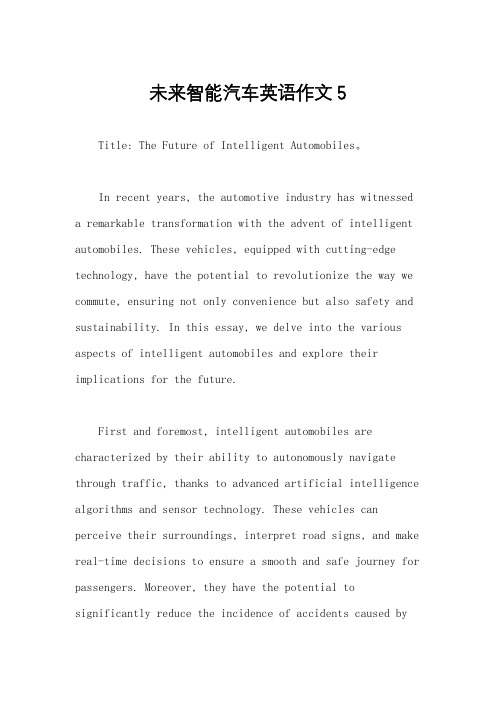
未来智能汽车英语作文5Title: The Future of Intelligent Automobiles。
In recent years, the automotive industry has witnessed a remarkable transformation with the advent of intelligent automobiles. These vehicles, equipped with cutting-edge technology, have the potential to revolutionize the way we commute, ensuring not only convenience but also safety and sustainability. In this essay, we delve into the various aspects of intelligent automobiles and explore their implications for the future.First and foremost, intelligent automobiles are characterized by their ability to autonomously navigate through traffic, thanks to advanced artificial intelligence algorithms and sensor technology. These vehicles can perceive their surroundings, interpret road signs, and make real-time decisions to ensure a smooth and safe journey for passengers. Moreover, they have the potential to significantly reduce the incidence of accidents caused byhuman error, thus making roads safer for everyone.Furthermore, intelligent automobiles are paving the way for a more sustainable future by incorporating electric or hybrid powertrains. With the looming threat of climate change, reducing greenhouse gas emissions from transportation is paramount. Electric and hybrid vehicles offer a cleaner alternative to traditional internal combustion engine vehicles, thus mitigating environmental degradation and contributing to efforts to combat climate change.In addition to their environmental benefits,intelligent automobiles are poised to revolutionize the concept of mobility. Ride-sharing services, enabled by autonomous driving technology, are becoming increasingly popular, offering an affordable and efficient means of transportation for urban dwellers. By optimizing routes and reducing idle time, these services not only reduce congestion but also minimize the need for individual car ownership, thereby freeing up valuable urban spacecurrently occupied by parking lots.Moreover, the integration of connectivity features in intelligent automobiles opens up a world of possibilitiesin terms of convenience and productivity. Through seamless integration with smartphones and other devices, passengers can stay connected while on the move, whether for work or entertainment purposes. Additionally, over-the-air software updates ensure that vehicles remain up-to-date with the latest features and security patches, enhancing the overall user experience.However, despite the numerous benefits offered by intelligent automobiles, several challenges need to be addressed to realize their full potential. One of the most pressing concerns is cybersecurity, as connected vehicles are vulnerable to hacking and unauthorized access. Manufacturers must prioritize robust cybersecurity measures to safeguard against potential threats and ensure the integrity of onboard systems.Furthermore, there are ethical and legal considerations surrounding the deployment of autonomous driving technology.Questions regarding liability in the event of accidents and the ethical dilemmas inherent in programming vehicles to make life-and-death decisions must be carefully addressed through comprehensive regulation and industry standards.In conclusion, intelligent automobiles represent a paradigm shift in the automotive industry, offering unparalleled levels of safety, sustainability, and convenience. However, realizing their full potential requires addressing various challenges, from cybersecurity to ethical considerations. With careful planning and collaboration between industry stakeholders and policymakers, intelligent automobiles have the power to transform the way we commute and usher in a more connected, sustainable future.。
未来智能汽车英文作文简单
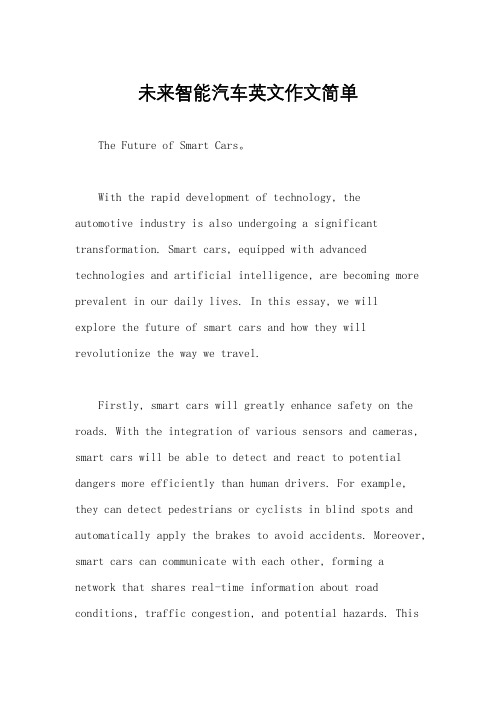
未来智能汽车英文作文简单The Future of Smart Cars。
With the rapid development of technology, theautomotive industry is also undergoing a significant transformation. Smart cars, equipped with advanced technologies and artificial intelligence, are becoming more prevalent in our daily lives. In this essay, we willexplore the future of smart cars and how they will revolutionize the way we travel.Firstly, smart cars will greatly enhance safety on the roads. With the integration of various sensors and cameras, smart cars will be able to detect and react to potential dangers more efficiently than human drivers. For example, they can detect pedestrians or cyclists in blind spots and automatically apply the brakes to avoid accidents. Moreover, smart cars can communicate with each other, forming a network that shares real-time information about road conditions, traffic congestion, and potential hazards. Thiscollective intelligence will help prevent accidents and improve overall road safety.Secondly, smart cars will bring about significant improvements in energy efficiency and environmental sustainability. Electric smart cars, powered by renewable energy sources, will reduce our dependence on fossil fuels and decrease harmful emissions. Additionally, smart cars will be equipped with advanced energy management systems that optimize power usage and reduce energy wastage. For instance, they can automatically adjust the air conditioning or heating based on the number of passengers in the car, thus minimizing energy consumption. These energy-efficient features will contribute to a greener and more sustainable future.Furthermore, smart cars will revolutionize the concept of transportation as a service. With the rise of autonomous driving technology, smart cars will become autonomous taxis or ride-sharing vehicles. This will lead to a shift from car ownership to car sharing, reducing the number of vehicles on the road and alleviating traffic congestion.Users will be able to summon a smart car through a mobile app, and the car will navigate itself to the desired destination. This convenient and cost-effective mode of transportation will transform the way we commute and travel.In addition, smart cars will provide a seamless and personalized driving experience. Artificial intelligence algorithms will learn from drivers' preferences and habits, allowing the car to adapt to individual needs. For instance, the car can adjust the seat position, temperature, andmusic playlist based on the driver's previous settings. Moreover, smart cars will be integrated with voice recognition and natural language processing technologies, enabling drivers to control various functions through voice commands. This intuitive and user-friendly interface will enhance the overall driving experience.However, the widespread adoption of smart cars also raises concerns about cybersecurity and privacy. As smart cars become more connected to the internet and other devices, they become susceptible to hacking and data breaches. Manufacturers and authorities must prioritizecybersecurity measures to protect users' personal information and ensure the safe operation of smart cars.In conclusion, the future of smart cars is promising and will bring about numerous benefits. From improved safety and energy efficiency to autonomous driving and personalized experiences, smart cars will revolutionize the way we travel. However, it is crucial to address cybersecurity and privacy concerns to ensure the successful integration of smart cars into our daily lives.。
智能汽车英语作文
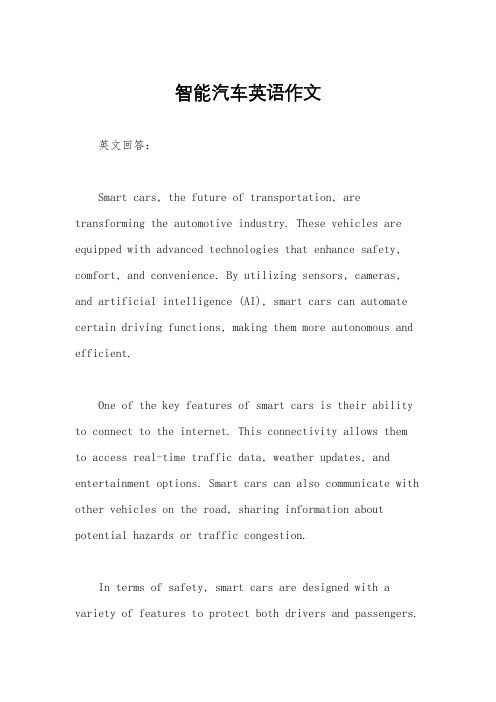
智能汽车英语作文英文回答:Smart cars, the future of transportation, are transforming the automotive industry. These vehicles are equipped with advanced technologies that enhance safety, comfort, and convenience. By utilizing sensors, cameras, and artificial intelligence (AI), smart cars can automate certain driving functions, making them more autonomous and efficient.One of the key features of smart cars is their ability to connect to the internet. This connectivity allows them to access real-time traffic data, weather updates, and entertainment options. Smart cars can also communicate with other vehicles on the road, sharing information about potential hazards or traffic congestion.In terms of safety, smart cars are designed with a variety of features to protect both drivers and passengers.These features include lane departure warning systems, automatic emergency braking, and blind spot monitoring. By detecting potential dangers and reacting accordingly, smart cars can significantly reduce the risk of accidents.Comfort and convenience are also key priorities for smart cars. They offer features such as adaptive cruise control, which automatically adjusts the car's speed to maintain a safe distance from the vehicle in front. Smart cars also provide voice-activated commands, allowingdrivers to control various functions without taking their hands off the steering wheel.Despite their numerous advantages, smart cars do come with some challenges. One concern is the potential for cyberattacks, as these vehicles are heavily reliant on technology. Additionally, the cost of smart cars can be higher compared to traditional vehicles, which may limit their widespread adoption.Overall, smart cars represent a significant advancement in the automotive industry. They offer enhanced safety,comfort, and convenience, and have the potential to revolutionize the way we travel. As technology continues to develop, we can expect smart cars to become even more autonomous and feature-rich, further transforming thefuture of transportation.中文回答:智能汽车,交通运输的未来,正在改变汽车工业。
有关smartcar英语作文
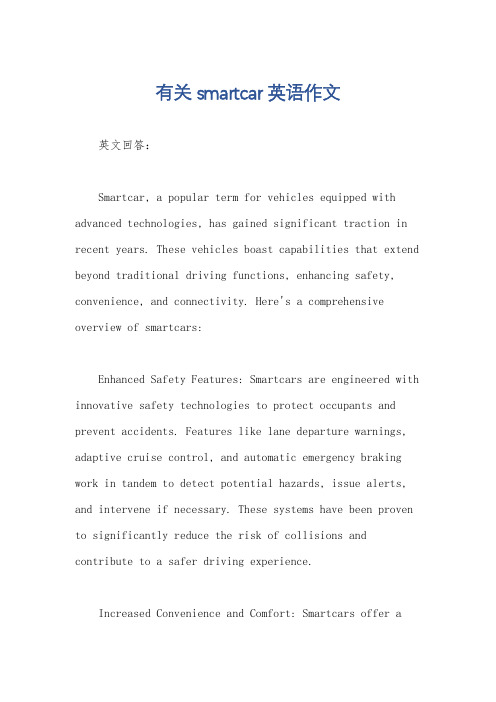
有关smartcar英语作文英文回答:Smartcar, a popular term for vehicles equipped with advanced technologies, has gained significant traction in recent years. These vehicles boast capabilities that extend beyond traditional driving functions, enhancing safety, convenience, and connectivity. Here's a comprehensive overview of smartcars:Enhanced Safety Features: Smartcars are engineered with innovative safety technologies to protect occupants and prevent accidents. Features like lane departure warnings, adaptive cruise control, and automatic emergency braking work in tandem to detect potential hazards, issue alerts, and intervene if necessary. These systems have been proven to significantly reduce the risk of collisions and contribute to a safer driving experience.Increased Convenience and Comfort: Smartcars offer arange of convenience features designed to enhance the driving experience. Keyless entry and ignition, remote start, and in-car navigation systems are just a few examples of the technologies that make driving more effortless and enjoyable. Additionally, smartphone integration allows drivers to control various vehicle functions, such as music playback and climate control, with just a few taps on their mobile devices.Improved Connectivity: Smartcars feature advanced connectivity capabilities that enable seamless integration with the digital world. Passengers can enjoy access tohigh-speed internet, streaming services, and social media platforms while on the move. The integration of voice-activated assistants further enhances convenience, allowing drivers to perform tasks like setting navigation destinations or making phone calls without taking their hands off the wheel.Environmental Sustainability: Some smartcars are designed with a focus on environmental sustainability. Electric and hybrid models offer reduced emissions andimproved fuel efficiency, contributing to a cleaner and greener driving experience. Advanced software systems optimize energy consumption and regenerative braking systems recover energy during deceleration, further enhancing the vehicle's environmental credentials.Smartcar Use Cases: Smartcars offer a wide range of use cases beyond personal transportation. In the commercial sector, smartcars can be deployed as autonomous delivery vehicles, ride-sharing services, and even mobile offices. Smartcars also have the potential to transform public transportation, enabling more efficient and sustainable mobility solutions.Conclusion: Smartcars represent a significant advancement in automotive technology, offering a range of benefits that enhance safety, convenience, connectivity, and sustainability. As the technology continues to evolve, we can expect even more innovative features andcapabilities to emerge, transforming the driving experience and shaping the future of transportation.中文回答:什么是智能汽车?智能汽车,一个用于配备高级技术的汽车的流行术语,近年来获得了相当大的关注。
智能汽车英语作文120词

智能汽车英语作文120词英文回答:The advent of smart cars has sparked significant excitement and anticipation in the automotive industry. These vehicles, equipped with advanced technologies and sophisticated software, offer a transformative driving experience, enhancing safety, convenience, and connectivity.Smart cars leverage various sensors, cameras, and radar systems to perceive their surroundings, enabling features such as lane departure warning, adaptive cruise control,and blind-spot monitoring. By monitoring traffic patterns and road conditions, smart cars provide real-timeinformation and assistance, reducing the risk of accidents.Moreover, smart cars offer enhanced convenience through features such as voice-activated commands, smartphone integration, and remote control. Drivers can seamlessly interact with their vehicles, accessing navigation,entertainment, and climate control from the comfort oftheir seats. The integration of smartphones allows for remote monitoring, vehicle diagnostics, and even unlockingor starting the car via mobile apps.Connectivity is another key aspect of smart cars. They leverage cellular networks and Wi-Fi to access the internet, enabling over-the-air software updates, remote diagnostics, and personalized services. By harnessing data from multiple sources, smart cars can continuously learn and adapt to individual driving patterns, preferences, and the surrounding environment.The growing adoption of smart cars presents both opportunities and challenges for the automotive industry. Automakers must invest in研发(research and development)and innovation to keep pace with technological advancements. Governments need to establish regulatory frameworks that ensure the safe and ethical deployment of smart cars, addressing concerns about data privacy and cybersecurity.As smart cars continue to evolve, they have thepotential to revolutionize the way we travel. By enhancing safety, convenience, and connectivity, smart cars offer a glimpse into the future of transportation, making our journeys more efficient, enjoyable, and safer.中文回答:智能汽车的出现引起了汽车行业极大的兴奋和期待。
智能汽车 英语作文

智能汽车英语作文Title: The Era of Smart Cars。
In the 21st century, the automotive industry is witnessing a profound transformation, propelled by advancements in technology. One of the most significant developments is the emergence of smart cars, also known as intelligent vehicles. Smart cars are equipped with various sensors, connectivity features, and advanced computing systems that enhance safety, efficiency, and conveniencefor drivers and passengers alike.First and foremost, smart cars are revolutionizing road safety. With features such as collision detection, automatic emergency braking, and lane departure warning systems, these vehicles can mitigate the risk of accidents and save lives. By continuously monitoring the surrounding environment and analyzing data in real-time, smart cars can anticipate potential hazards and assist drivers in making informed decisions. Furthermore, the integration ofartificial intelligence enables these vehicles to learn from past experiences and adapt their behavior accordingly, further enhancing safety on the roads.Moreover, smart cars are reshaping the concept of transportation through connectivity and automation. Through the Internet of Things (IoT) technology, smart cars can communicate with other vehicles, infrastructure, and external devices, creating a connected ecosystem known as V2X (vehicle-to-everything) communication. Thisconnectivity enables features such as intelligent traffic management, predictive maintenance, and optimized route planning, leading to smoother traffic flow and reduced congestion. Additionally, the advent of autonomous driving technology promises to revolutionize the way we travel, with smart cars capable of navigating roads independently, freeing drivers from the task of driving and potentially reducing the incidence of human errors.In addition to safety and efficiency, smart cars offer unparalleled convenience and comfort to occupants. Advanced infotainment systems, voice-activated controls, andseamless integration with smartphones allow passengers to stay connected and entertained while on the move. Furthermore, features like adaptive cruise control, automated parking, and remote vehicle monitoring enhance the overall driving experience, making it more enjoyable and stress-free.However, the widespread adoption of smart cars also raises concerns regarding cybersecurity and data privacy. As vehicles become increasingly connected and reliant on software systems, they become vulnerable to cyber attacks and unauthorized access. Manufacturers must prioritize cybersecurity measures to safeguard against potential threats and ensure the integrity and confidentiality of data transmitted by smart cars. Moreover, clear regulations and guidelines are needed to address privacy issues and establish standards for the collection, storage, and use of personal data generated by these vehicles.In conclusion, the advent of smart cars represents a paradigm shift in the automotive industry, promising safer, more efficient, and more convenient transportationsolutions. With advanced technologies such as AI, IoT, and autonomous driving, smart cars have the potential to redefine the way we perceive and interact with vehicles. However, realizing the full potential of smart cars requires addressing challenges related to safety, cybersecurity, and privacy. By overcoming these hurdles, we can usher in a new era of mobility that is smarter, safer, and more sustainable.。
- 1、下载文档前请自行甄别文档内容的完整性,平台不提供额外的编辑、内容补充、找答案等附加服务。
- 2、"仅部分预览"的文档,不可在线预览部分如存在完整性等问题,可反馈申请退款(可完整预览的文档不适用该条件!)。
- 3、如文档侵犯您的权益,请联系客服反馈,我们会尽快为您处理(人工客服工作时间:9:00-18:30)。
• today I'm going to introduce smart cars.
what is smart car?
Smart car in movies
• I Robot
• The Dark Knight
The D YOU!
Toyota
Changing length
• Changing length. This is another special, useful technology of smart cars.
• When you are driving a car alone, you can press a button installed in the dashboard, then your car will shorten, the number of seats will become one, and your car needs less fuel to start up.
• On the contrary, your car will increase its seats in the case of carrying several people.
• Benefit from this technology, to establish an economical society is no longer a dream.
BMW
solar energy
Changing outlook
• This car has a special function. It can change the outlook when you tired of it. What you need to do just download the design drawing of the car,and then the scanner on the car will help you to change the outlook of the car. You don’t need to buy a new one with the changeable one.
model
driverless car
Google’s smart car
Pro-environment
• Uses clean energy solar and wind energy as fuel. Solar and wind power are inexhaustible. When the car in a sunny mainly uses solar energy, and in cloudy days, cars on the use of wind energy. Car which is equipped with two wind energy batteries, used in turn. As long as cars can be switched on, it will produce wind energy, wind energy will not use up.
Details
• Security • Pro-environment • Changing outlook • Changing length
Security
• Equipped with advanced radar systems and sensors, with high artificial intelligence system. The system can automatically identify traffic lights and traffic signs, detecting obstacles on the road ahead, road conditions, and automatic driving.
Audi
concept car
nissan
Toyota
Apple icar
• Benz -smart
Conclusion
• In a word, Cars will be automatically controlled by a computer. All the driver will have to do is say where to go and the computer will do the rest.
